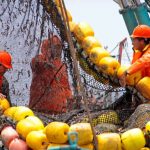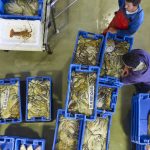A new Seafish research project to produce a design specification for equipment to automatically extract meat from the shells of brown crab, could potentially save the UK crab processing sector over £1,000,000 per annum.
“Whilst much of the process of extracting low value cooked meat has been automated throughout the food industry in the UK, the extraction of brown crab meat is still largely undertaken by hand. This involves individuals in very repetitive manual operations. Once extracted the meat is then traditionally fed by hand into mincing or shell separation machines, before being hand filled into mould or bags for sealing,” said Marcus Jacklin, Seafish Project Manager.
“It is estimated that manual labour cost to extract this meat by hand is around £1 per kg of crab meat, which could be reduced by 50% if this process was automated. Assuming that 15,000 tonnes of crab is processed into around 2,000 tonnes of crabmeat each year within the UK, in the long-term this represents an annual saving to the sector of £1,000,000.”
Seafish is funding this work through the Orkney Fishermen’s Society, a co-operative running one of the premier brown crab processing factories in the UK, in collaboration with the Scottish Manufacturing Advisory Service, the Scottish Association for Marine Science and Nizo Food Research.
The project will focus on the automated extraction, pasteurisation and packing of brown crab meat. The aim is to produce a functional design specification for an automated mechanical process where the meat is ‘sucked’ out of the shell, then pasteurised as it passes through a pipe with an ‘in-line’ heat process facility, and then auto-filled into a vertical pouch before sealing.
“Brown crab processing is a high volume/low value activity. At a local level this project will be of immediate benefit. The two co-operative factories in the Orkney Islands are key local employers and provide a very important outlet for local inshore fishermen. Both factories are facing a significant increase in operating costs and this project could be a potential route to cost reduction, as well as allowing them to increase product throughput.
“In the wider context the UK brown crab processing sector can only benefit from research which has the potential to improve the efficiency of processing operations, reduce costs and minimise health and safety risks,” said Marcus.








